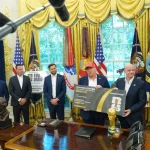

Gun rights activists are projecting confidence in response to the new Centers for Disease Control and Prevention leader saying she is receptive to the Biden administration’s call to frame gun violence as a public health matter.
“The American public at this juncture isn’t willing to give up more of their freedoms and their rights and their privileges to the government under the guise of health,” Alan Gottlieb, founder of the Second Amendment Foundation, told the Washington Examiner.
NINE TAKEAWAYS FROM THE DEVON ARCHER TRANSCRIPT
CDC Director Mandy Cohen, who took over for Rochelle Walensky in July, said in a recent interview with NPR that there is much the CDC can already do to act on the matter of gun violence from a public health perspective.
“I think there’s a lot of creative work going on around the country. We need to lift up best practices of gun safety,” Cohen said. “Just like we make cars safer with seat belts, there are ways for us to make guns safer. We don’t want to see children lose their lives needlessly because of guns.”
“This isn’t the first time that the CDC has tried to make the issue of guns a public health issue,” Gottlieb said. “They’ve done this in the past, and part of this is trying to get funding for anti-gun research, and then pushing it to the medical profession … as a public health problem.”
The CDC began funding research on the correlation between guns and domestic violence in the early 1990s in connection with the agency’s broader project to reduce violence-related deaths and injuries.
But it soon faced restrictions from Congress. In 1996, Arkansas Republican Rep. Jay Dickey drafted a provision into legislation funding the CDC that said, “None of the funds made available in this title may be used, in whole or in part, to advocate or promote gun control.” Similar provisions have been enacted in the years since. The so-called Dickey Amendment was extended to appropriations for the National Institutes of Health in 2011.
Although the Dickey Amendment had long been interpreted as a prohibition into gun violence research from a public health perspective, efforts to change the interpretation of the Dickey Amendment were successful in 2019, with Congress appropriating $25 million to the CDC and $12.5 million to the NIH for gun violence research, with the stipulation that it does not promote gun control.
Cohen repeatedly said her top goal is to restore public trust in the CDC after the agency’s failures from COVID-19 brought confidence in the organization to record lows. The CDC, according to Cohen, can only be an informational tool for communities and politicians to use in making policy decisions.
However, in recent weeks, Vice President Kamala Harris has explicitly used the language of public health to frame the need to address gun violence through legislation.
Gun violence is the leading cause of death of children in our nation.
This epidemic is preventable. We need commonsense gun safety laws, including an assault weapons ban and universal background checks. Congress must have the courage to act.
— Vice President Kamala Harris (@VP) May 25, 2023
Harris recently called gun violence a preventable “epidemic” and has continued to stress the need to push for additional “commonsense gun safety laws.”
After the mass shooting in Buffalo, New York, in May 2022, Harris made a veiled comparison between gun violence and the COVID-19 pandemic in her call for an “assault weapons” ban.
“On the issue of gun violence, I will say, as I’ve said countless times, we are not sitting around waiting to figure out what the solution looks like. You know, we’re not looking for a vaccine,” Harris said at the time, referring to passing gun legislation through Congress.
The right to be safe from gun violence in school, at work, in a place of worship, and at the grocery store should be thought of as a civil right.
@POTUS and I already strengthened background checks, and we’re continuing to push for additional commonsense gun safety laws.— Vice President Kamala Harris (@VP) August 3, 2023
Second Amendment groups, however, argue that public health rhetoric will be ineffective, even in a health-focused 2024 election cycle.
“It’s not a health issue,” Gottlieb said. “You can’t get COVID from a gun. … It’s not a communicable disease.”
Gottlieb said, however, that COVID-19 has changed the way people respond to public health language.
“In [the] post-COVID era, we’ve seen the government use … health angles to gain more power and control over people. And that’s what gun control is really all about,” Gottlieb said. “I think it’s really played out, and I think it’s [going to] backfire on the other side.”
The National Rifle Association‘s Billy McLaughlin expressed similar thoughts to the Washington Examiner when asked if the CDC’s change in leadership on this matter could be problematic.
CLICK HERE TO READ MORE FROM THE WASHINGTON EXAMINER
“The simple fact is that this effort is a camouflaged assault on the Second Amendment rights of law-abiding Americans,” McLaughlin said. “The Biden administrative state is filled with appointed gun-ban extremists who are assigned tasks that undermine the rights of law-abiding Americans and distract from their boss’s failures.”
According to the American Public Health Association, over 38,000 premature deaths and nearly 85,000 injuries are attributable to firearms each year.





